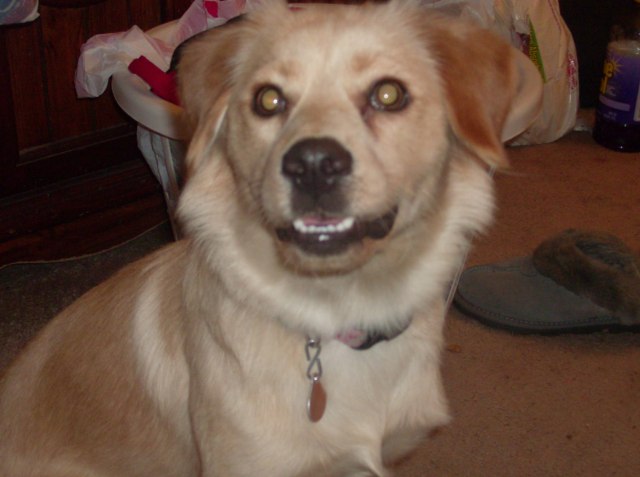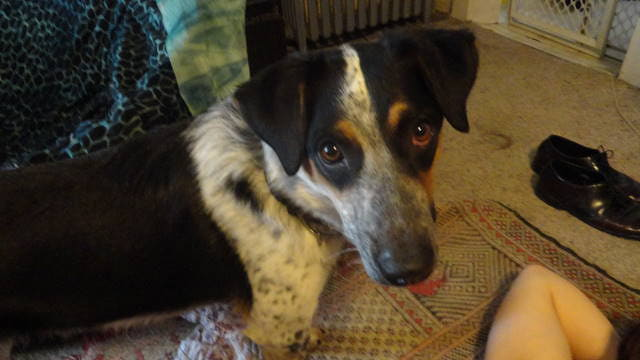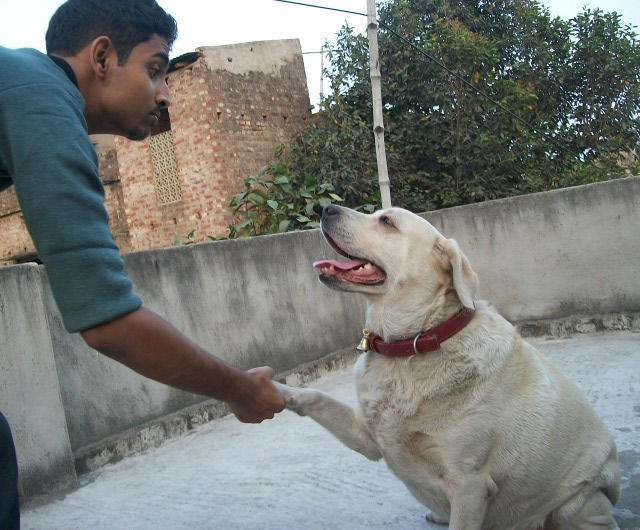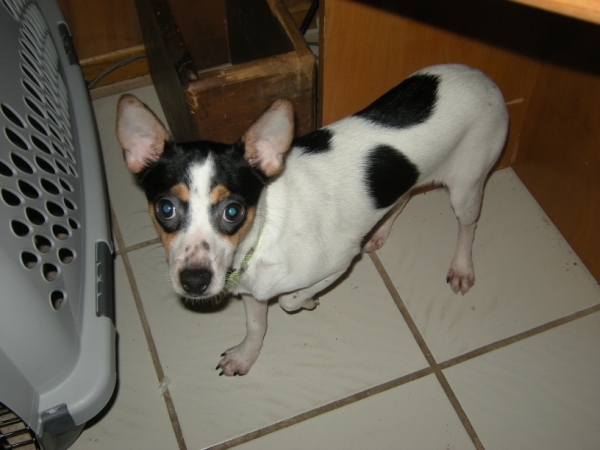QuestionI am unable to pay for this question to be answered. That is why I am using this service. With money I could have gone to a dog behavior specialist.
Urania
-------------------------
Followup To
Question -
Hi Chris and Beth,
I have a dog I got from the Humane Society a year ago. He was about 2 1/2 months old at the time.
He is a mix (and it has been guessed) of Labrador, Doberman and Shepard.
He is a stubborn dog with aggressive tendencies. He is the biting type which worries me. I have survived with him due to watching Cesar Millan the dog whisperer on TV.
My dog, Buster Brown, gets the best food and toys and walks and play time. He is never left alone as I work at home. Although he is difficult, he is not neurotic, nor do I let him have bad habits.
There is one disturbing thing about him.
When it is late at night and we are getting ready for bed (he sleeps on a doggy bed at the foot of our bed) and I when pet him and caress his face and say good night and what a good dog he is, he gets this weird look on his face and starts growling and seems as if he would do something vicious like lunge at me. This has been going on for quite a few months and has discouraged me from going near him to say goodnight
It is sad to me that he is like this, but I am puzzled about this behavior.
Have you any clue as to what is going on here?
Thank you so much for your time.
Urania
Answer -
Hi Urania,
Glad to hear that you adopted from the Humane Society. We've got 5 "rescue" dogs ourselves (although most of ours were adopted as adults with problems).
Thanks for your question. Canine Aggression is a behavior that all dogs exhibit given the right circumstances. It is a normal behavior as long as the aggression is appropriate. That is, as long as it is displayed at the right time and place and as long as it is not excessive.
When behaviorists treat pathological aggression, a detailed case history is taken during the first session. This takes about an hour and will allow the behaviorist to determine the root cause of the aggression. This step is absolutely essential and we never advise clients until this is completed. Doing so will most likely result in a misdiagnosis and an incorrect treatment plan. Also, if misdiagnosed, the treatment plan will usually make the aggression worse and will often result in the owner getting bit.
We offer this service via a phone consultation. Our price is $135 for an hour, but if you mention that you were referred through allexperts.com, you will receive a $40 discount (making it $95 for the first session). At the end of the session, we will have a detailed diagnosis and a preliminary behavior modification plan. This is simply a couple of exercises to get you started until you receive the pdf document detailing your personalized treatment plan. This will arrive via e-mail within one week.
Alternatively, you may choose to hire a behaviorist in your area. We do not recommend a trainer for because this is beyond the scope of their services. Your vet should be able to help you find a local behaviorist.
As discussed, we cannot make recommendations specific to your case without a full case history (beware anyone who says they CAN!). However, in cases very similar to yours, we have treated the problem thus:
We offer this service via a phone consultation. The price is $135 for the hour, but if you mention that you were referred by me (Chris), you will receive a $40 discount (making it $95 for the first session). At the end of the session we will have a diagnosis and will set you up with a few exercises to get started with during the first week's behavior modification plan. Within a week you will receive a pdf document via email detailing your personalized treatment plan. We recommend a second session to go over the plan, but if you wish you may simply work from the document we sent.
Of course you may go to any professional behaviorist (not a trainer though � this is beyond the scope of their services). Your vet should be able to help you find a behaviorist in your area.
As discussed, we cannot make recommendations specific to your case without a full case history (beware anyone who says they CAN!). Until you get professional help, you might want to read an article about a program called Nothing in Life is Free (nilif). This is a program we often implement in situations similar to yours. If you follow this link and scroll down, you will see an article called "Nothing in Life is Free": http://www.ddfl.org/tips.htm#dog . On the same page, you might also want to read "Dealing with Dominance in Dogs."
Rest assured that you are not alone in experiencing this type of problem. Buster Brown is at the age (around a year old) when dominant traits often emerge. Fortunately, you recognize the need for help and are taking action before the problem gets worse. If we can help you further, please don't hesitate to contact us!
AnswerUrania,
Chris & I spent several hours last night (and today) creating a behavior history form (and a disclaimer) so that we can get all of the information we need to make a diagnosis for you. If you will take the time to fill this out completely, we can give you a diagnosis and give you an exercise to get you started on a behavior modification plan.
***I, (enter your name here), have read and agree to the Positive Paws disclaimer found at: www.downstay.com/release.php.***
Canine Behavioral History
Please answer all questions to help us make recommendations for you.
What is the main behavior problem or complaint?
How frequently does the problem occur (how many times daily, weekly or monthly):
Chronology Of The Behavior Problem
At what age did you first notice the problem? When did it first become a serious concern?
Has the frequency changed? If so, please describe.
Has the intensity changed? If so, please describe.
Has this problem changed in other ways?
Describe several examples of the behavior in detail:
What have you done so far to try to correct the problem?
How do you discipline your dog for this and for other misbehavior?
In what general circumstances does the dog misbehave?
Home Environment
Please list all people, including yourself, who live in your household (please cut & paste to enter as many people as necessary):
Person:
Adult/child? If child, what is their age?
Number of hours away from home:
Relationship with dog (friendly, distant; feeds, walks, trains dog)
Please list all animals in household (put dog with problem 1st; use numbers in front of pet's name to indicate the order in which they were obtained; again, cut & paste as many times as needed):
Name
Species
Breed
Sex
Neutered/spayed? At what age?
Age obtained
Age now
Relationship to dog (friendly, hostile, fearful)
What type of area do you live in (urban, suburban, rural)?
What type of home do you live in (house, condo, apt)?
Have you moved since acquiring your dog? If yes, how many times?
Has your household changed since acquiring your dog (people/animals moved in or out? Change in the number of hours spent with dog? serious illnesses/accidents?)?
If yes, please describe:
Dog's Background
Why did you decide to get a dog?
Have you owned a dog before?
Why did you choose this breed?
Where did you get this dog (SPCA, breeder, newspaper ad/flyer, pet store, friend, stray)
How many dogs did you have to choose from?
Why did you choose your dog over others (please be specific):
Was a temperament test performed? If so, what were the results?
Describe your dog's behavior as a puppy:
Do you have any information about the behavior of litter mates and/or parents?
Did you meet the parents? If yes, please describe their behavior:
Has this dog had other owners? If yes, how many?
Why was the dog given up by previous owners?
If neutered/spayed, why was this done?
Were there any behavior changes after neutering? If so, please describe:
If your dog is �intact� has he/she ever been bred? Do you plan to breed?
If you have an intact female, when was her last heat? Was it normal?
Diet and Feeding
Please describe your feeding routine:
Who feeds?
Brand name of food:
Amount & time fed (ex. � c. at 7AM & 6PM)
Location where dog is fed:
Favorite treat:
Other animals fed at same time? If so, please describe routine.
Daily Schedule
Please describe a typical 24-hour day in your dog's life:
How does the dog behave with familiar visitors?
How does the dog behave with unfamiliar visitors (children or adults)?
How do you exercise your dog (length of time and activities)?
Is the dog free in a fenced yard?
Is the dog tied outside?
Does the dog run free?
How do you play with your dog?
What toys does the dog have?
Is your dog housetrained?
How was the dog housetrained?
Does your dog ever eliminate in the house (if yes, is it urine/feces? how often? Location? Any changes)?
Where does your dog sleep at night (e.g. crate in laundry room, his bed in your bedroom, wherever he wants):
Have there been any changes in your dog's sleeping pattern (more, less, same)?
Where is your dog when alone in the house?
Where is your dog when you have guests?
How does your dog behave while you are leaving the house?
How does your dog behave when you return?
Obedience Training
What basic obedience training has your dog had? (None, Trained at home, Started obedience classes but didn't finish, Puppy kindergarten, Basic obedience, Intermediate or higher, Private trainer, Other classess)
How old was the dog when obedience training started?
Who in the family is the primary trainer? Does anyone else work with the dog?
Does your dog have any awards or titles? (Please describe)
Has your dog had any specialized training (hunting, herding, protection, attack or Schutzhund training)?
What percentage of the time does your dog obey the following commands for each family member (copy & paste as many times as necessary):
Family member:
Sit:
Down:
Stay:
Come:
Heel:
Does your dog know any tricks? Please describe:
Have you exhibited your dog in breed shows?
Jump up on anyone without permission?
Paw at you or others?
Lick you?
Mount people? Whom?
Mount other animals or objects? Please describe.
Bark at you?
Bark at other times? Please describe.
What is your dog's activity level in general (Low, Average, High, Excessive)
Medical History
Is your dog on any medication now, for this or other problems?
Has your dog been on medication in the past?
When was your dog's last rabies given (1 yr. or 3 yr.)?
Aggression Screen (Please fill out for every family member; you can use different colors of text, copy and paste list multiple times indicating which list is for which individual, or make note only for situations in which there are different reactions)
GR - growl
SL - snarl/bare teeth
SB - snap/bite
NR - no reaction
NA - not applicable
1. pet dog
2. hug dog
3. kiss dog
4. lift dog
5. call off furniture
6. push/pull off furniture
7. approach on furniture
8. disturb while resting/sleeping
9. approach while eating
10. touch while eating
11. take dog food away
12. take human food away
13. take water dish away
14. take rawhide
15. take biscuit/cookie
16. take real bone
17. take toy/object
18. approach when dog has any object/toy/bone
19. verbally punish
20. physically punish
21. visual threat
22. speak to dog (normal tone)
23. stare at dog
24. bend over dog
25. push on shoulders or back
26. approach dog near spouse
27. enter room
28. leave room
29. reach toward dog
30. leash restraint
31. collar restraint
32. scruff restraint
33. put leash on/take off
34. put collar on/take off
35. bathe dog
36. towel dog
37. groom/brush dog
38. dog at groomer's
39. trim nails
40. leash/collar correction
41. response to "sit"
42. response to "down"
43. dog at veterinary clinic
44. unfamiliar adult enters house or yard
45. unfamiliar child enters house or yard
46. familiar adult enters house or yard
47. familiar child enters house or yard
48. response to toddlers/babies
49. dog in car at tollbooths, gas stations
50. unfam. adult approaches owner, dog on leash
51. unfam. child approaches owner, dog on leash
52. dog in house, sees people outside
53. response to other dogs, while on leash
54. response to other dogs, while not on leash
Where are you on a scale of 1 to 5 as follows:
1. I am only curious - problem is not serious.
2. I would like to change problem, but it is not serious.
3. Problem is serious and I would like to change it, but if it remains unchanged that's OK.
4. Problem is very serious and I would like to change it; if it doesn't, I will keep my dog.
5. Problem is very serious and I would like to change it; if it doesn't change, I will have my dog
euthanized or give him/her up.
FOR AGGRESSION TOWARDS PEOPLE (Skip if aggression is not the problem):
Please answer yes or no to these characteristics of your dog's aggressive behavior:
______attacks are sudden and surprising
______episodes appear unprovoked
______dog is abruptly docile after an episode
______dog appears "sorry" afterwards
______dog appears disoriented afterwards
______episodes are associated with a "glazed" or "absent" expression
______I can usually tell what will set off my dog
______aggressive behavior is new and uncharacteristic
Has your dog bitten and broken skin? If yes, number of bites that broke skin:
Total number of bites (that did or did not break skin):
Total number of episodes of aggression (growling, snapping, biting):
Describe typical episode (eg. does dog growl, lunge or bite, and what are circumstances?):
If dog is in above situation 10 times, how often is aggression seen (eg. All=100%, just one=10%, etc.)?
What parts of the body has dog bitten and how severe were injuries?
Who is/are target(s) of aggression?
Did your dog bite as a puppy? If yes, please describe (include age):
How old was your dog the first time he/she growled at a person?
What was the circumstance?
How old was your dog the first time he/she snapped or bit at a person?
What was the circumstance?
* * * * * * * * * * * * * *

 Running/Non-Obeying
Question
Star
I have a female Lab mix who has this obse
Running/Non-Obeying
Question
Star
I have a female Lab mix who has this obse
 A doting mother in need of help!
Question
Chewy
In the past year I got a cattle d
A doting mother in need of help!
Question
Chewy
In the past year I got a cattle d
 5 yr old lab fetch problem!
Question
handshake
Hello.I am Rameez from India
5 yr old lab fetch problem!
Question
handshake
Hello.I am Rameez from India
 dealing with a blind 5yr old Cavalier
Question
Skipper
I have a lovely, 5 yr old Caval
dealing with a blind 5yr old Cavalier
Question
Skipper
I have a lovely, 5 yr old Caval
 Potties insides but NEVER outside...
Question
This is my buddy :)
I have a 6 month old Fox T
Potties insides but NEVER outside...
Question
This is my buddy :)
I have a 6 month old Fox T